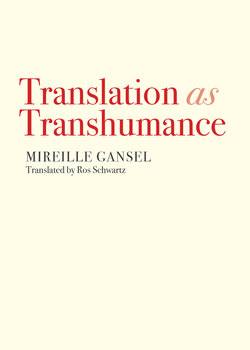Читать книгу Translation as Transhumance - Mireille Gansel - Страница 13
На сайте Литреса книга снята с продажи.
ОглавлениеSALVAGED LANGUAGE
Aunt Renée’s eyes look as if they have been hewn from the crystal blue of twilight. This silver-haired elderly lady is one of Grandfather Nathan’s nieces. Her voice sounds surprisingly familiar. I close my eyes and I hear Szerenke—the same register, the same intonations. On the table in the little kitchen, the Sabbath candles are lit. The French window is open onto the rose garden that Uncle Eduard lovingly tends in this religious section of one of the oldest kibbutzim in Israel. Recently arrived from Czechoslovakia, during the final days of the Prague Spring, he is putting down new roots by tending his flower beds. Bending over the earth, he weeds, prunes, waters, and contemplates, in infinite silence and with infinite patience. That same silence that echoed around their daughter’s table, where I first met them, at her apartment outside Tel Aviv. A gulf of silence between them and their grandson Judah, who is celebrating his twentieth birthday surrounded by his army friends. A gulf of silence, for want of a common language. Not Czech, nor Hungarian, nor German, nor Yiddish. Vectors of an entire world, culture, history, memory. So many internal wellsprings now forgotten, buried beneath the thick layer of the noncommunicated, the noncommunicable.
Sabbath evening in the little blue kitchen, the fine white hand-embroidered tablecloth appears even whiter in the flickering candlelight. Aunt Renée and Uncle Eduard pray in Hebrew and chant the psalms with a gentle, grave joy. Then, in the quiet of the evening, in soft, low, solemn voices, they bring back to life a world that has been swallowed up. So many murdered loved ones, whom they alone remember and commemorate.
Taking turns, sometimes speaking at the same time, they tell their stories as if drinking long drafts from the fount of their lives, as if the starry night will never end. They speak in a German accented with all its neighboring languages: Hungarian, Czech, Yiddish. Language of the soul, language without a home. Salvaged language.
